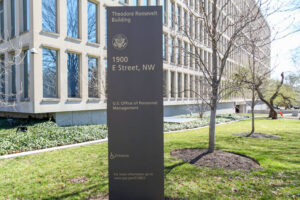
Though DC ranks 10th in the nation for the highest metro area population, it ranks fifth for having the highest GDP, at approximately $530 billion per year. Much of that economic activity serves the public interest and relies on the seeds of public funds. As the heart of the three branches of government, every federal agency’s supply lines depend on budgets passed in the halls of Congress. If you want to get close to real power and influence, talk to someone whose work intersects with any federal supply chain.
As the nation’s center of gravity, closely aligned interests related to government contracting hold a tight orbit here in DC. This includes sectors heavily dependent on supply chains – notably defense, healthcare and education.
DC is also the administrative capital of many organizations that depend on its strategic location near the halls of power, and the infrastructure here that helps support supply chain operations. Amtrak and CSX both have rail lines transiting through DC, alongside interstate highways and three major airports – Reagan National, Dulles, and Baltimore/Washington.
There’s a lot of business to be done here, and a lot of talent in the world of logistics and supply chain management capable of getting it done. As both the public sector and leading private companies recruit from this talent pool, demand is high. But supply chain management isn’t a field where demand alone offers the assurance of a job. It takes a degree in SCM to show you have what it takes, whether it’s a bachelor’s to prepare for entry- and mid-level management roles or an MBA or other master’s to prepare for roles in high level leadership.
The Nation’s Largest Employer Relies on the World’s Most Complex Supply Chains
 With an annual budget of over $6 trillion the DC-headquartered federal government employs more than four million people, with around a quarter of those serving active-duty in the military. For comparison, Walmart employs around 1.5 million and McDonald’s about 420,000.
With an annual budget of over $6 trillion the DC-headquartered federal government employs more than four million people, with around a quarter of those serving active-duty in the military. For comparison, Walmart employs around 1.5 million and McDonald’s about 420,000.
There are unique supply chain requirements that depend on the federal department you’re dealing with:
- Supply lines make the difference in armed conflicts, and the Department of Defense has an army of SCM professionals dedicated to the mastery of supply chains for each branch of the Armed Forces.
- The Department of Homeland Security leads agencies like Customs and Border Protection and the peacetime Coast Guard, which both involve supply chains that support aircraft, boats, weapons, drones, and more.
- The Central Intelligence Agency uses supply chains at home and abroad to support specialized electronic and human asset missions.
- The US Department of the Interior manages agencies like the Fish and Wildlife Service, Bureau of Land Management, and the National Park Service. These all require supply chains for things like vehicles, specialized tools, communications, and survey equipment.
Many federal jobs are classed on the General Schedule (GS) professional scale. Mid-level administrative and management jobs start at the GS-5 level. These have education requirements, experience requirements, and sometimes both. On the GS scale you can often substitute qualifying education to fulfill experience requirements, and vice versa.
For example, a Procurement Analyst with the State Department starts at the GS-5 level. A Supervisory General Supply Specialist with the US Naval Supply Systems Command starts at the GS-7 level. A Logistics Management Specialist with the Joint Chiefs of Staff is at the GS-13 level. Pay increases with higher levels, as do the education and experience requirements.
Focusing on education, this is how the requirements progress up through the GS levels:
- GS-5 – requires a bachelor’s degree
- GS-7 – requires one year of graduate-level education
- GS-9 – requires a master’s degree
- GS-11 – requires a doctoral degree
Like any employer the federal government strives to hire the most qualified professionals who are best prepared for success. If you’re looking to move up the ranks of a federal agency, then earning a relevant degree is about the best move you can make.
What Does a Supply Chain Manager Do in the District of Columbia?
SCM spans multiple sectors but the underlying principles of it are consistent no matter where you work. These are introduced in undergraduate SCM degree programs and cover topics like:
- Principles of logistics and transportation
- Supply chain design and global sourcing
- Information technology in SCM
Graduate programs go deep into the topics you cover in an undergraduate program and give you skills you’ll build on throughout your career. An MBA with an SCM concentration or a master’s in SCM explore:
- Sales, inventory, and operations planning
- Strategic international trade and logistics management
- Optimization techniques and integrated logistics systems
- Lean supply processes and quality management
- Databases and analytical software for supply chain management
If you’re changing careers to focus on SCM then stacking a graduate degree on top of an existing bachelor’s degree is an attractive bonus option.
Once you graduate and you’re ready to join the professional workforce you’ll find a range of opportunities in different sectors.
Madison Government Solutions specializes in providing services for the defense, intelligence, and law enforcement communities. To work as a Logistics Planner with MGS you need at least a BA degree in a relevant discipline. As is common for many positions in DC, you may also need to obtain a security clearance.
The types of duties involved with this position include:
- Scheduling capacity across divisions to accommodate project changes
- Working with divisional managers to track work progress according to schedule
- Improving efficiency by data collection and analysis
Serco North America contracts with the US and Canadian governments as well as the private sector to provide citizen services, services related to defense, and transportation. As part of its defense contracting Serco is working with the US Navy to develop, design, and test the next-generation submarine that will replace the Ohio class.
Working on this exclusive project as a Submarine Supply Chain Manager requires at least a bachelor’s degree in a managerial or technical discipline, and a secret security clearance. Duties involved with the position include:
- Identifying and prioritizing critical system components for strategic supply chain design
- Conducting obsolescence management with industry-recognized information systems
- Creating communication channels to share mitigation plans and emergent risks
Government is a huge sector in DC that’s supply-chain reliant. But there are plenty of others too, and they’re all looking for qualified SCM professionals with competitive academic credentials:
- Education, like DC Public Schools and Georgetown University
- Healthcare, like at the MedStar Washington Hospital Center, Sibley Memorial Hospital, and Children’s National Medical Center
- Aerospace and defense, like Booz Allen Hamilton and nearby BAE Systems North America and General Dynamics
Supply Chain Management Schools – Universities in the District of Columbia Offering Degrees in SCM Online and On-Campus
We’ve gathered data for every school offering an SCM program in DC and across the nation, tracking tuition, online or on-campus offerings, and much more. Once you graduate, you’ll be ready to hit the ground running and launch into a career whose only limits are your imagination!
Georgetown University
School of Continuing Studies
Accreditation: MSCHE
Campus, online

- Master of Professional Studies (MPS) in Supply Chain Management







